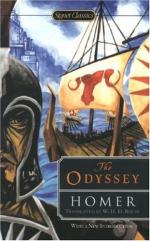As he spoke he lashed his horses and they started off at full speed through the town towards the open country. They swayed the yoke upon their necks and travelled the whole day long till the sun set and darkness was over all the land. Then they reached Pherae, where Diocles lived who was son of Ortilochus, the son of Alpheus. There they passed the night and were treated hospitably. When the child of morning, rosy-fingered Dawn, appeared, they again yoked their horses and their places in the chariot. They drove out through the inner gateway and under the echoing gatehouse of the outer court. Then Pisistratus lashed his horses on and they flew forward nothing loath; ere long they came to Pylos, and then Telemachus said:
“Pisistratus, I hope you will promise to do what I am going to ask you. You know our fathers were old friends before us; moreover, we are both of an age, and this journey has brought us together still more closely; do not, therefore, take me past my ship, but leave me there, for if I go to your father’s house he will try to keep me in the warmth of his good will towards me, and I must go home at once.”
Pisistratus thought how he should do as he was asked, and in the end he deemed it best to turn his horses towards the ship, and put Menelaus’s beautiful presents of gold and raiment in the stern of the vessel. Then he said, “Go on board at once and tell your men to do so also before I can reach home to tell my father. I know how obstinate he is, and am sure he will not let you go; he will come down here to fetch you, and he will not go back without you. But he will be very angry.”
With this he drove his goodly steeds back to the city of the Pylians and soon reached his home, but Telemachus called the men together and gave his orders. “Now, my men,” said he, “get everything in order on board the ship, and let us set out home.”
Thus did he speak, and they went on board even as he had said. But as Telemachus was thus busied, praying also and sacrificing to Minerva in the ship’s stern, there came to him a man from a distant country, a seer, who was flying from Argos because he had killed a man. He was descended from Melampus, who used to live in Pylos, the land of sheep; he was rich and owned a great house, but he was driven into exile by the great and powerful king Neleus. Neleus seized his goods and held them for a whole year, during which he was a close prisoner in the house of king Phylacus, and in much distress of mind both on account of the daughter of Neleus and because he was haunted by a great sorrow that dread Erinys had laid upon him. In the end, however, he escaped with his life, drove the cattle from Phylace to Pylos, avenged the wrong that had been done him, and gave the daughter of Neleus to his brother. Then he left the country and went to Argos, where it was ordained that he should reign over much people. There he married, established himself, and had two famous sons Antiphates and Mantius.




